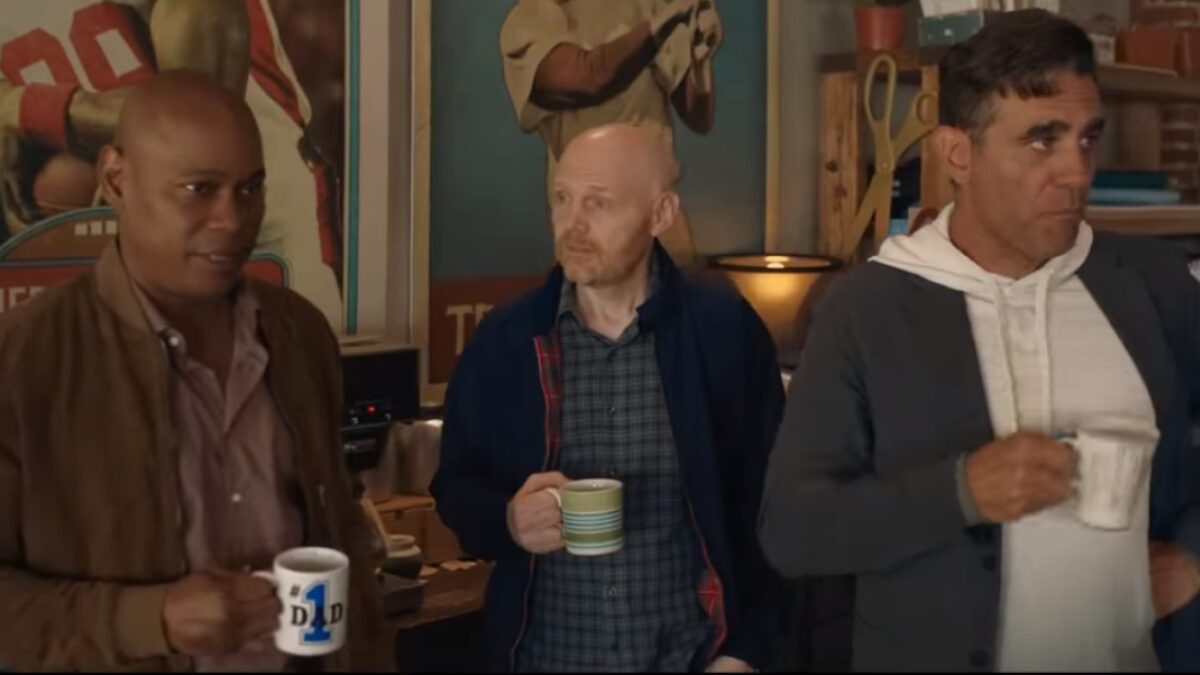Comedians are at their best when we don’t have to search for the punch line. Bill Burr’s directorial debut, “Old Dads,” forces the audience to do some searching, leaving viewers to wonder if they’re watching comedy or satire. Some may think they found themselves at open-mic night at the comedy club.
Burr’s character, Jack Kelly, opens the movie singing praises of family and friendship, teasing a film about parenthood. But it’s not long before he purposefully trips his friend’s son while the boy is running, all the while slinging F-bombs. Burr offers the audience such glimpses into his critiques of helicopter parents and overly sensitive adults, but he never redeems the characters or explains their imperfections in a way to leave the audience satisfied that such flawed characters have something to teach us.
After Kelly’s monologue and scenes introducing the main players, the film pivots to the small business run by Kelly and his friends, Mike Richards (played by Bokeem Woodbine) and Connor Brody (Bobby Cannavale). This sets up a commentary on surveillance culture and political correctness in the workplace.
Here is where Burr begins to blur the lines between comedy and political satire. If you don’t agree with Burr’s politics or don’t think he goes far enough, viewers will have to decide what parts are meant to be funny or if Burr can actually deliver a knockout blow to mock woke sensibilities.
Conservative and liberal audiences may agree with Burr’s general criticisms of our hyper-sensitive culture, but members of neither side of the aisle will find moral consistency in his positions. Conservatives will notice the obvious objectification of women throughout, especially in the “Hangover”-esque segue to the film’s conclusion, while lefties may have turned the film off by that point after Burr’s steady (and warranted) attacks on microaggressions and identity politics.
Just because the film is bound to offend everyone at different points doesn’t make “Old Dads” a satire. Satire is designed to make us think the joke through to the end, helping us understand the world better through life’s absurdities. Compare “Caddyshack” to “The Life of Brian.”
Bill Murray eating a candy bar at the bottom of a pool and early religious fanatics arguing over whether to worship a shoe are both funny, but for different reasons. Burr’s film tries to be both comedy and satire without a clear target, and the moral ambiguity is bound to confuse audiences.
The story’s incomplete moral lessons are most pronounced in Rachel Harris’ character, Dr. Lois Schmieckel-Turner, the head of Kelly’s son’s school. Harris is clearly enamored with leftist ideas such as restorative justice and white privilege, but the scenes that draw out the flaws in these perspectives lead Kelly to lose his temper (repeatedly) and make a fool of himself in public.
So we cannot trust Kelly’s character for even imperfect moral leadership, nor can we trust Mike and Connor. They struggle with their own efforts to take responsibility for their marriages and keep their basest male instincts in check throughout the movie, seemingly for comedic purposes. Meanwhile, Schmieckel-Turner never has to grapple with the faults in her bullying leadership style. Her comeuppance in the end has nothing to do with her Marxist politics or intimidation and feels more like a deux ex machina.
When entertainment takes aim at those on the extreme ends of opposing ideologies, audiences should know who they are rooting for or if the goal is to poke fun at extremism in general. “Old Dads” only allows us to root for some of the characters some of the time. Burr’s dedication to family — fatherhood primarily — is the only consistency. Even the commitment to marriage from Kelly and his friends seems always teetering on the edge of an abyss.
Burr misses an opportunity to make a lasting cultural comment, even though woke sensibilities offer ample opportunity for such satire, because family, work, and lasting relationships won’t hold together without a moral magnet at the center. Religion and tradition typically serve this purpose, but Burr points to neither.
We laugh hardest when we know what we’re laughing at, whether it’s ourselves, someone else, or the culture around us. Those familiar with Burr’s criticisms of woke sensibilities during his stand-up routines won’t be disappointed in “Old Dads.” Audiences may find a laugh, but those looking for meaning in the absurdity will have to go elsewhere.









